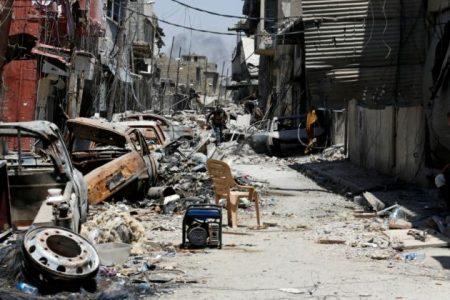
Booby-traps in homes in the northern parts of Iraq as Islamic State targets returning civilians
As people return home to Mosul and other areas of northern Iraq freed from Islamic State, homemade bombs and explosives laid on an industrial scale by the insurgents are claiming hundreds of victims and hampering efforts to bring life back to normal.
Houses, schools, mosques and streets are all booby-trapped, a big problem in West Mosul following its recapture by government forces this month after nine months of fighting.
Beyond Mosul, in villages and fields stretching from the Plain of Nineveh to the Kurdish autonomous region, retreating Islamic State fighters have sown a vast area with improvised bombs and mines as their self-proclaimed caliphate shrinks.
“The scale of contamination? There are kilometres and kilometres and kilometres of active devices, sensitive enough to be detonated by a child and powerful enough to blow up a truck,” Craig McInally, operations manager for Norwegian People’s Aid anti-explosives project, said.
While mines are usually laid in rows in open ground, improvised explosives in buildings are wired into household appliances such as fridges, heaters and televisions, primed to explode at the flick of a switch or an opened door, experts say.
Since clearing operations began last October, about 1,700 people have been killed or injured by such explosives, according to the United Nations Mines Action Service, which co-ordinates the clearing campaign.
By targeting civilians, Islamic State hopes to thwart a stabilisation effort aiming to get people back to their homes, jobs and studies, rebuild infrastructure and reinstate government rule.
While the crisis lasts, Islamic State – whose strategy extends far beyond military operations – could thrive again, said Charles Stuart, charge d’affaires at the European Union mission in Iraq.
Source: Reuters





